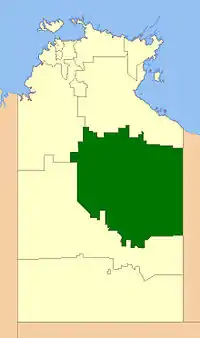Barkly Region
The Barkly Region, formerly Barkly Shire, is a local government area of the Northern Territory of Australia, administered by the Barkly Regional Council. The region's main town is Tennant Creek. The region covers an area of 322,713 square kilometres (124,600 sq mi) and had a population of almost 7,400 as at June 2018.[1]
| Barkly Region Northern Territory | |||||||||||||||
|---|---|---|---|---|---|---|---|---|---|---|---|---|---|---|---|
 | |||||||||||||||
| Population | 7,392 (2018)[1] | ||||||||||||||
| • Density | 0.0229058/km2 (0.059326/sq mi) | ||||||||||||||
| Established | 2008 | ||||||||||||||
| Area | 322,713 km2 (124,600.2 sq mi)[1] | ||||||||||||||
| Council seat | Tennant Creek | ||||||||||||||
| Region | Barkly Tableland | ||||||||||||||
| Territory electorate(s) | Barkly | ||||||||||||||
| Federal division(s) | Lingiari | ||||||||||||||
 | |||||||||||||||
| Website | Barkly Region | ||||||||||||||
| |||||||||||||||
History
In October 2006 the Northern Territory Government announced the reform of local government areas. The intention of the reform was to improve and expand the delivery of services to towns and communities across the Northern Territory by establishing eleven new shires. The Barkly Shire was created on 1 July 2008, as were the remaining ten shires. On 1 January 2014, it was renamed Barkly Region.[2]
The Barkly Region is administered by the Barkly Regional Council.
The most recent elections of Councillors were held on 26 August 2017. The current President (Mayor) of the Region is Steve Edgington.
In 2019, a proposal was made to build a 15,000 ha (37,000-acre) solar farm in the region, which would become the world’s largest solar energy project.[3]
In 2021, the region had the lowest rate of vaccination against COVID-19 pandemic.[4]
Wards
The Barkly Regional Council is divided into 4 wards, which is governed by a President and 12 councillors across four wards:
- Alyawarr Ward (South) (4)
- Patta Ward (West) (5)
- Kuwarrangu (until 2016 Yapakurlangu) (Northeast) (2)
- Alpururrulam Ward (Southeast) (1)
Localities and communities
Land within the Barkly Region was divided during 2007 into bounded areas for the purpose of creating an address for a property. The bounded areas are called "localities", with those localities associated with Aboriginal communities being called "communities".[5][6]
Localities
Communities
Outstations
Outstations, also known as homelands, are tiny remote settlements, often comprising an extended family. Outstations in Barkly include:
- Mulga Bore,[lower-alpha 1] also known as Akaya, Akaye, Atartinga and Athathenga, a family outstation (longitude: 134.209, latitude: -22.451), which includes Mulga Bore School[7]
Footnotes
- Not to be confused with Old Mulga Bore, a heritage-listed site in South Australia.
References
- "3218.0 – Regional Population Growth, Australia, 2017-18: Population Estimates by Local Government Area (ASGS 2018), 2017 to 2018". Australian Bureau of Statistics. Australian Bureau of Statistics. 27 March 2019. Retrieved 25 October 2019. Estimated resident population, 30 June 2018.
- Tollner, David William (18 December 2013). "Local Government Act changes to local government areas and councils" (PDF). Northern Territory Government Gazette. Northern Territory Government. p. 3. Retrieved 26 April 2019.
with effect from 1 January 2014:
- Brown, Carmen (17 July 2019). "Oil and gas giant Eni starts work on Northern Territory's largest solar farm in race to 50pc renewables by 2030". ABC News. Australian Broadcasting Corporation. Retrieved 12 July 2021.
- Hynes, Nicholas (26 September 2021). "New data shows remote NT vaccination levels will fall short of November target at current rate". ABC News. Australian Broadcasting Corporation. Retrieved 28 October 2021.
- "Northern Territory localities and suburbs". Place Names Committee. Northern Territory Government. Retrieved 25 April 2019.
- "Barkly". Place Names Committee. Northern Territory Government. Retrieved 25 April 2019.
- "Mulga Bore - family outstation". BushTel – Remote Communities of the NT. Northern Territory Government. Retrieved 16 October 2022.